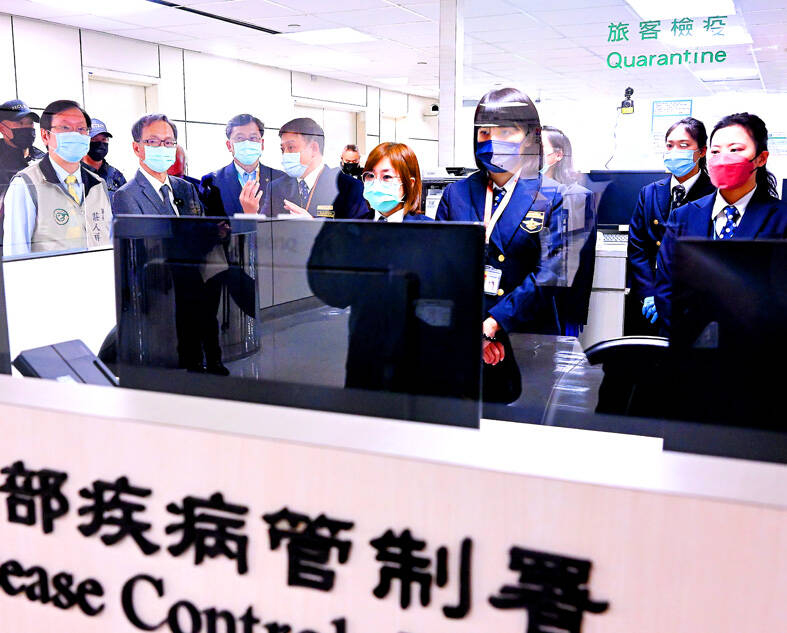Among 52 travelers who arrived from China, Hong Kong or Macau with respiratory illness and received a voluntary pathogen screening test at an airport quarantine station, 32 tested positive for one of the five screened respiratory viruses, the Centers for Disease Control (CDC) said yesterday, adding that the voluntary testing would likely continue until the Lunar New Year holiday in February.
As a surge in respiratory illnesses including pneumonia, mostly among children, has been reported in China, the CDC on Sunday last week notified international airport quarantine stations to increase alertness and encouraged travelers from China, Hong Kong and Macau with flu-like symptoms to undergo voluntary pathogen testing.
The pathogen testing can detect 17 types of viruses and four types of bacteria in the respiratory tract, including influenza viruses, COVID-19 strains, rhinoviruses, Mycoplasma pneumoniae bacteria, adenoviruses and human metapneumovirus.

Photo: Chu Pei-hsiung, Taipei Times
Minister of Health and Welfare Hsueh Jui-yuan (薛瑞元) and CDC Director-General Chuang Jen-hsiang (莊人祥) yesterday visited Taiwan Taoyuan International Airport to oversee the fever screening and respiratory pathogen testing operations at the quarantine station.
Hsueh said 52 travelers who arrived from China, Hong Kong or Macau received the respiratory pathogen testing between Sunday last week and Thursday, with 34 people testing positive for one of the five screened viruses.
Most of them had influenza viruses, followed by COVID-19 viruses, while the Mycoplasma pneumoniae bacteria many people have concerns over was not detected, he said.
The CDC’s data show that of the 34 cases, 20 (58.8 percent) had flu viruses, eight (23.5 percent) had COVID-19, three (8.8 percent) had adenoviruses, two (5.9 percent) had rhinoviruses and one (2.9 percent) a parainfluenza virus.
There have always been Mycoplasma pneumoniae infections in Taiwan, with ups and downs in case numbers each year, but it has not led to an epidemic outbreak, Hsueh said, adding that as the incubation period for Mycoplasma pneumoniae can be long, if travelers get infected and were not detected at quarantine stations, it would be difficult to tell if they are imported or local cases after they develop symptoms and are diagnosed with the bacteria.
However, he said the centers would not designate Mycoplasma pneumoniae an imported bacterium that poses a risk of wide-scale epidemic outbreak, as there are no signs of it doing so.
Hsueh said the voluntary testing program was launched to detect if there are new variants or other novel pathogens, because although the Chinese government claims that its surge of respiratory illnesses are caused by known pathogens, the CDC still has concerns and hopes to confirm the claim through testing.
“The voluntary testing program will be shortened or extended according to the outbreak situation in China, but the current plan would be to continue it until the Lunar New Year holiday [in February],” he said. “Because travelers from China are expected to gradually increase before the Lunar New Year.”

Taiwan is stepping up plans to create self-sufficient supply chains for combat drones and increase foreign orders from the US to counter China’s numerical superiority, a defense official said on Saturday. Commenting on condition of anonymity, the official said the nation’s armed forces are in agreement with US Admiral Samuel Paparo’s assessment that Taiwan’s military must be prepared to turn the nation’s waters into a “hellscape” for the Chinese People’s Liberation Army (PLA). Paparo, the commander of the US Indo-Pacific Command, reiterated the concept during a Congressional hearing in Washington on Wednesday. He first coined the term in a security conference last

Prosecutors today declined to say who was questioned regarding alleged forgery on petitions to recall Democratic Progressive Party (DPP) legislators, after Chinese-language media earlier reported that members of the Chinese Nationalist Party (KMT) Youth League were brought in for questioning. The Ministry of Justice Investigation Bureau confirmed that two people had been questioned, but did not disclose any further information about the ongoing investigation. KMT Youth League members Lee Hsiao-liang (李孝亮) and Liu Szu-yin (劉思吟) — who are leading the effort to recall DPP caucus chief executive Rosalia Wu (吳思瑤) and Legislator Wu Pei-yi (吳沛憶) — both posted on Facebook saying: “I

Sung Chien-liang (宋建樑), who led efforts to recall Democratic Progressive Party (DPP) Legislator Lee Kun-cheng (李坤城), was released on bail of NT$80,000 today amid outcry over his decision to wear a Nazi armband to questioning the night before. Sung arrived at the New Taipei District Prosecutors’ Office for questioning in a recall petition forgery case last night wearing a red armband bearing a swastika, carrying a copy of Adolf Hitler’s Mein Kampf and giving a Nazi salute. Sung left the building at 1:15am without the armband and covering the book with his coat. Lee said today that this is a serious

A mountain blaze that broke out yesterday morning in Yangmingshan National Park was put out after five hours, following multi agency efforts involving dozens of fire trucks and helicopter water drops. The fire might have been sparked by an air quality sensor operated by the National Center for High-Performance Computing, one of the national-level laboratories under the National Applied Research Laboratories, Yangmingshan National Park Headquarters said. The Taipei City Fire Department said the fire, which broke out at about 11am yesterday near the mountainous Xiaoyoukeng (小油坑) Recreation Area was extinguished at 4:32pm. It had initially dispatched 72 personnel in four command vehicles, 16